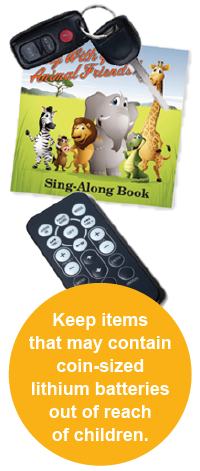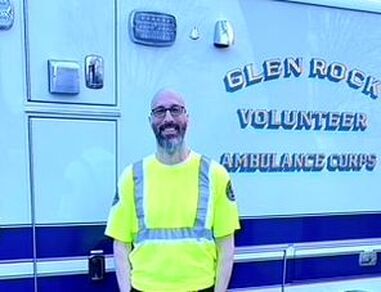Child Safety
Child Safety in the Home
- Keep bleach, ammonia, and cleaning supplies out of children’s reach; they can be very poisonous.
- Poison Control Center
- Call: 1-800-222-1222
- Text: 8002221222@njpies
- Website: https://www.njpies.org/
- Poison Control Center
- Keep all medications and vitamins out of children's reach.
- Get down to your child’s eye level and look for potential safety hazards.
- Don’t use baby walkers with wheels, especially around stairs, drops or pools.
- Keep window blind cords wrapped up and out of reach.
- Review our burn prevention tips.
- Don’t leave a baby on a changing table; stay at the side of the table while changing diapers.
- Buckle the belts on highchairs and strollers.
- Keep chairs, cribs, beds, and furniture away from windows.
- Don’t play on the stairs.
- Remove objects from the stairs.
- Screens are meant to keep bugs out, not children in. Properly install window guards to prevent unintentional window falls. For windows above the first floor, include an emergency release device in case of fire.
- Install window guards that adults and older children can easily open in case of emergency. Include this in your family’s fire escape plan and practice it regularly.
- Install window stops so that windows open no more than four inches.
- Open windows from the top and close after use.
- Keep kids from climbing near windows.
- If you have windows that can open from both top and bottom, make a habit of opening just the top to prevent accidental falls. Keep in mind that as kids grow, they may have enough strength, dexterity and curiosity to open the bottom.
- Keep windows locked and closed when they are not being used.
- If your baby is in a carrier, remember to place it on the floor, not on top of a table or other furniture.
- Help babies learn to stand and walk safely
- There are some things to know about baby walkers: They don't come with safety features that prevent the walkers from rolling down the stairs, and it's easy for children to fall or reach higher objects that may be unsafe. So please be extra careful.
- Because baby walkers can be dangerous, try using a stationary activity center. These items give your baby a chance to practice standing and moving more safely. Look for one that is on a stable, non-moveable base and place it away from stairs, hot appliances or window cords.
- Use approved safety gates at the tops and bottoms of stairs and attach them to the wall, if possible. Remember to read the manufacturer's instructions and warning labels to make sure you have the right gate for your needs. Not all gates are safe for use at the top of stairs.
- Actively supervise toddlers on stairs. Hold their hands when walking up and down stairs.
- Consider anti-slip rugs for the floors in your home, and mats or decals in the bathtub or shower to help prevent dangerous falls.
- Keep hallways and stairs well-lit and clear of clutter.
- Don't let kids play on high porches, decks, stairs or balconies. If it's unavoidable, make sure they are supervised by an adult.
- Show older kids how to be responsible
- Talk to your kids about appropriate play behaviors. We know some play can be physical, but it's important to know when and where it's appropriate.
- Prevent TV and furniture tip-overs by securing them to the wall using mounts, brackets, braces, anchors or wall straps to prevent tip-overs. These kinds of accident happen more than you might think so take a few minutes, secure your TV and furniture, and then never worry about it again.
- Don't let children climb on furniture or use drawers or shelves as steps.
|
Battery Safety
Little kids love to explore, and when they find something new, what’s the first thing they do? Put it in their mouths. Electronic devices are getting smaller, slimmer and sleeker. There are mini remote controls, small calculators, watches, key fobs, flameless candles and musical greeting cards. Kids love to pick them up, play with them and take them apart, often exposing dangerous button batteries inside. Here are few things to remember to make sure these batteries stay where they belong. Each year in the United States, more than 2,800 kids are treated in emergency rooms after swallowing button batteries. That's one child every three hours. The number of serious injuries or deaths as a result of button batteries has increased ninefold in the last decade. Top Tips
|
Children Safety Outside The House
- Take your kids to playgrounds with shock-absorbing surfaces such as rubber, synthetic turf, sand, pea gravel, wood chips or mulch. If your child falls, the landing will be more cushioned than on asphalt, concrete, grass or dirt.
- Take your kids only to playgrounds that are well maintained.
- Prevent older siblings from pushing younger children on swings. They push too hard trying to make the swing go too high. They can push the child off or collide with neighboring swing.
- It's important that kids have the freedom to be creative and push their limits. That means wearing a helmet for appropriate activities such as biking or snowboarding to prevent a head injury that can ruin the fun down the road.
- If possible use shopping carts with wheeled attachments for kids.
- Don't leave your child alone in a shopping cart.
- If possible, use shopping carts that have a wheeled child carrier that is permanently attached. Some of these models look like cars or benches attached to the shopping cart, so your kids will love them.
- If you are placing your child in a shopping cart seat, use a harness or safety belt. If the belt is missing or broken, select another cart.
- We know that letting your child ride in the cart basket, under the basket, on the sides or on the front of the cart is fun. It can also be dangerous.
Water Safety
- Don’t leave children alone in a bathtub, pool, or standing water (including buckets and toilets).
- Don’t rely on inflatable toys, bubbles, rings, rafts, or floaties to prevent drowning.
- Put high fences around pools and hot tubs.
- Wear a U.S. Coast Guard-approved Personal Flotation Device (PFD) when boating.
- Sign up children for swimming lessons.
icycle Safety Un-Helmeted Bicycle Crash
People involved in a cycle crash while not wearing a helmet are at serious risk of head injury. Brain injury has one of the highest mortality rates of all crash outcomes. Other common cycle crash injuries include bone fracture, with significant danger of spinal fractures leading to paralysis.
It is important to know that people who have sustained a brain trauma may appear to be uninjured in the minutes following a crash. However, if there is undetected bleeding inside the skull, the individual’s condition can deteriorate rapidly. That is why paramedics often press seemingly unharmed crash victims to go to a trauma center for evaluation. Watch our Helmet Safety Video.
Always wear a helmet videohttps://www.froedtert.com/trauma/choose-safe-injury-prevention/safety-video
People involved in a cycle crash while not wearing a helmet are at serious risk of head injury. Brain injury has one of the highest mortality rates of all crash outcomes. Other common cycle crash injuries include bone fracture, with significant danger of spinal fractures leading to paralysis.
It is important to know that people who have sustained a brain trauma may appear to be uninjured in the minutes following a crash. However, if there is undetected bleeding inside the skull, the individual’s condition can deteriorate rapidly. That is why paramedics often press seemingly unharmed crash victims to go to a trauma center for evaluation. Watch our Helmet Safety Video.
Always wear a helmet videohttps://www.froedtert.com/trauma/choose-safe-injury-prevention/safety-video
* Content on this page is from Froedtert.com, Poison Control.
|
"As a resident of Glen Rock for over 20 years, I’ve felt the need to “give back” in a way that would allow me to help others. The GRVAC affords me the opportunity to assist our residents in their times of need. The feeling of accomplishment and pride in helping others after a call, is something I
truly enjoy, and validates my decision to become a member back in 2021. Working alongside all the members of the GRVAC allows me to get to know some very dedicated residents who I’m proud to call my colleagues." Mike Goshin |


